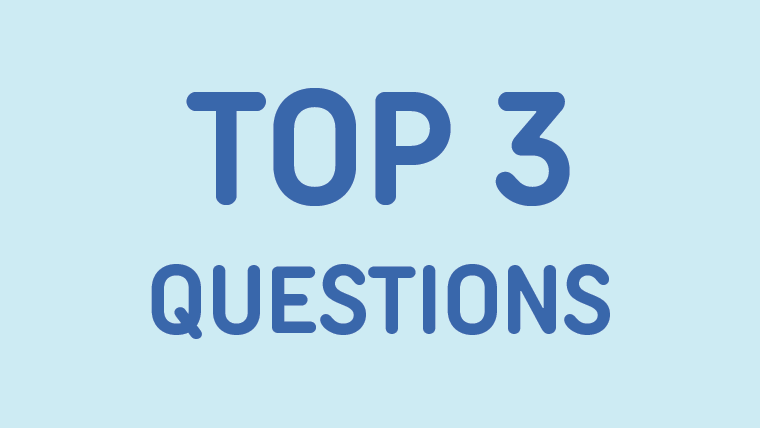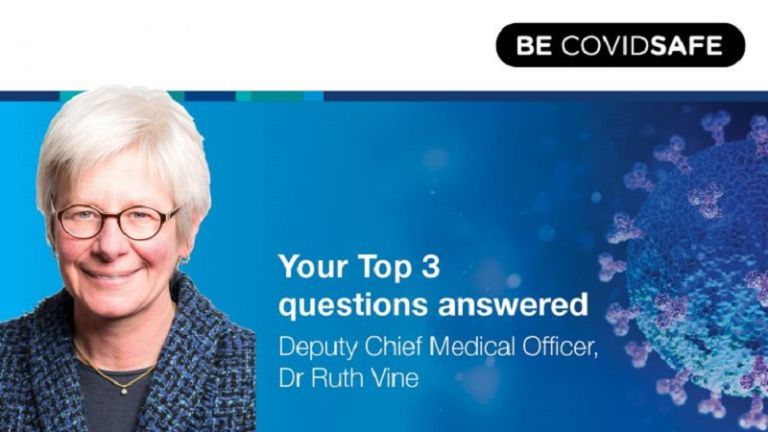
Top 3 vaccine questions
- What advice can I give my child if they’re feeling anxious about returning to school and worried about getting COVID-19?
- How do I assist my friend or family member to get through isolation when sick?
- I’m feeling increasing tired, angry and frustrated, how do I face 2022?
RUTH VINE: Hello, my name is Ruth Vine.
I’m the Deputy Chief Medical Officer in the area of mental health and bringing you today a top three.
And, look, my first shout out is to all of those people who are working in the health industry at this time under such difficult circumstances, particularly those in our hospitals.
But also, of course, to those who are operating our helplines and coming to work day after day to receive calls from those people who ring them, often in great distress.
My thanks to you all.
My first question is,
“What advice can I give my child
“if they’re feeling anxious about returning to school “and worried about COVID-19?”
Firstly, of course, I’d say these are very uncertain and extraordinary times and it is not unusual for you or your child to be anxious about this and to want to seek reassurance.
And as a parent, one of the very important things you can do is to be as clear and as honest and to give time to your child so they can explore whatever uncertainties they may have.
But parental modelling is a really important part of how to reduce your child’s anxiety.
Secondly, of course, vaccines are now available for children aged 5-12, and we’re sort of increasingly getting those vaccines into arms and I would say that it’s really important to make sure that you persist with that.
So, as parents, carers, guardians, look after your own mental health and wellbeing.
And that means for yourself, whenever you can, make sure you sleep as well as you can, you have a good and balanced diet, that you do still manage to get out and get some regular exercise, that you do do things that you enjoy, and, indeed, do things with your child or children that they enjoy, and also stay connected to your own friends and support network.
I think it’s also really important to reassure children that COVID, as we know, for children, is most often a mild illness, that vaccinations are protective, and that Australia is a very well vaccinated country.
It’s also important to explore with your child about wearing a mask, their usual hand hygiene, a little bit about social distancing.
And important to remember that there’s good evidence that wearing a mask is protective, but also good evidence that wearing a mask doesn’t cause emotional problems or distress.
People see a lot of our emotions through our eyes and eye expressions, even when the lower half of our face is covered up.
So, listen to them, explain things to them, and I’m sure that getting back to school will happen and that it will happen safely.
So, thank you very much.
My next question.
“How do I assist my friend or family member
“to get through isolation when sick?”
This is a really important area, of course, because while some of us don’t mind being on our own and may even seek to be on our own, for many people, being isolated, being away from family and friends, being unable to leave the house, is very stressful and very difficult.
And the way that we care about each other during this time can have a really significant impact on improving that experience.
So, there are ways that you can be close without putting yourself at risk and without being physically close.
You can stay in contact by phone, by video, by the sort of social media that we’ve become so used to using.
And often a way to do this is to make it regular.
So, to make it that the person knows that someone will contact them at a particular time or on a particular day.
That you will, perhaps, be able to offer to help them do things that they’re very worried about, like helping them with walking their dog or making sure that appropriate foods and so forth are delivered to them.
So, there’s lots that you can do.
I would also highlight that there are a lot of helping resources out there for people who may be isolating, including children, and children who are isolating with parents and things like the Smiling Minds app are among those.
I think particularly, of course, if the person who is isolating is elderly or has other vulnerabilities, then making sure that they know when to seek more professional help or when to call for other health services is also important.
And I also would highlight that when things are difficult, people who are vulnerable tend to become more vulnerable.
So, if it’s someone who already has a mental illness, or who has experienced a mental illness or already has difficulty with language or difficulty with self care, then these challenges may be even greater and more active steps may need to be taken.
Remember that there’s lots of good advice on websites.
is a very good place to start.
My next question is,
“I am feeling increasingly tired, angry and frustrated.
“How do I face 2022?”
And, look, I would respond by saying, it is 2022, we are now entering the third year of this, so we are into sort of the chronic stress rather than an acute stress, so you’re absolutely not alone.
Being a bit irritable, struggling to be as kind or as polite to people as you know you should be and would like to be, is a very common symptom of people who are undress stress, who are just over it.
But it does mean it’s a little reminder to take, again, when you can, take time for yourself.
Take time to do those things that we know are good for our overall mental health, like trying to sleep regularly, trying to get a good diet, trying to stay socially connected, as I mentioned before.
It’s also important, I think, not to become too preoccupied with the numbers and with the almost incessant news and media information about the pandemic and about the situation across our states and territories.
So, don’t stay glued to your radio or television, but sort of try and limit your intake of news and media.
And that’s really trying to normalise the situation as much as we can.
And I know that’s incredibly difficult for some people at the moment, particularly, again, those working within the hospital setting.
So, and again, if things really get on top of you, please do reach out for help.
I think that’s all I have time for today.
Thank you very much.







